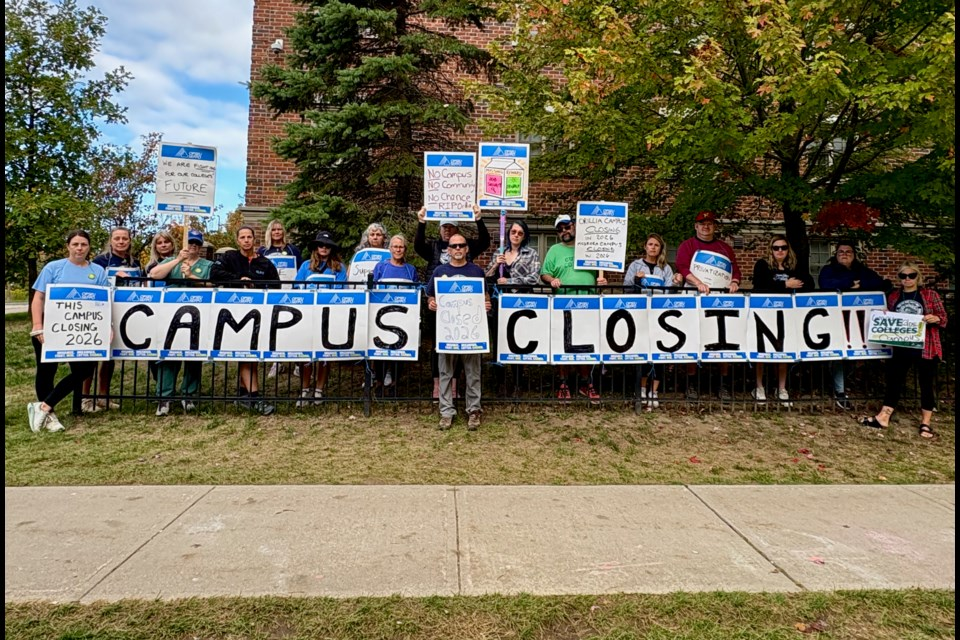
The Canadian post secondary education system is on the edge of a massive crisis, prepared by decades of underfunding from all layers of government. Now, the federal cap on international students threatens to push the system over the edge.
In response, university administrations across the country are carrying out layoffs, cuts to programs and all sorts of cuts to services and benefits for students and workers.
Already, an estimated 10,300 layoffs in institutions across Canada have been announced since 2024.
The administration at York University, in Ontario, has suspended 18 previously offered programs. Aurora College, in the North West Territories, has closed all of its satellite campuses and moved the majority of its courses online. Kwantlen Polytechnic University, in British Columbia, is reducing overtime, cutting faculty salaries by four per cent, and has issued layoff notices to 70 faculty members.
These examples show the fate of all post secondary institutions facing the reality of deficit budgets. It is the workers and students who are made to suffer through job losses and a reduced quality of education.
Cracks in the foundation
Historically, provincial governments have been the largest funders of Canada’s public colleges and universities. But governments have progressively cut or frozen funding since the 1980s. In 1987-88, provincial funding made up 78 per cent of university operating revenue. By 2022, that share had fallen to just 34 per cent.
The federal cuts of Jean Chretien’s government in the 1990s accelerated this crisis. In 1995, the federal government slashed $7.6 billion dollars in transfer funds, which starved the provinces who then offloaded the cost onto students and education workers.
As a result, tuition fees were deregulated. Consequently, tuition has more than quadrupled since then. Today student tuition makes up the majority of colleges’ and universities’ revenue.
International students in particular have come to pay the majority of tuition in Canada. By charging these students extortionary tuition (as high as ten times the domestic rate), the Canadian ruling class has effectively used international students as cash cows. This enabled them to maintain educational infrastructure.
But now the federal government finds political utility in scapegoating immigration for the problems in Canadian society. It has reduced the annual number of international study permits issued per year by 45 per cent. This has left a massive hole in the budgets of education institutions.
And we have to expect the problem to get worse, as the Carney government goes ahead with austerity.
The federal government is responsible for 8.6 per cent to 12.4 per cent of the budgets of post secondary institutions. If they cut education transfer funds, the consequences will be severe.
Corporate blood suckers
In the midst of this, administrations have turned to corporate consultants. The Nous group, the most notorious of these consultancy firms, has secured “renewal” contacts with 20 top universities across Canada. This firm is known for suggesting to “optimize” schools with cuts to the workforce and program closures.
For example, it aided the “restructuring” of Laurentian University in the midst of its bankruptcy in 2021. The group proposed Laurentian use loopholes in the law to bypass collective agreements and terminate hundreds of staff and faculty. This resulted in the elimination of 70 programs and the loss of nearly 200 jobs.
These consultants also advised the University of Alberta’s board of governors during their 2020 “restructuring”; the result was that more than 1000 jobs were lost and course selection was severely reduced.
Education workers have therefore nicknamed the group “Nous-feratu”, rightly recognizing them as blood suckers.

Fight the cuts, fight capitalism
But the recommendations of consultancy groups like Nous are only logical under capitalism in crisis.
The fact of the matter is that the precarious economic scaffolding of the Canadian education system has begun to break down. And this is the case for all public services around the country with Carney implementing 15 per cent cuts across the board. If anything, the crisis in the post secondary education system is a taste of things to come for every public service across the country.
But workers will not sit idle as their livelihoods become simple numbers in the calculation for balanced budgets. Resistance to the coming cuts have begun across the country.
Currently, 10,000 unionized college support staff across Ontario are on strike against sweeping austerity measures.
“The college system has been hemorrhaging jobs long before bargaining began” states the Ontario Public Service Employees Union (OPSEU) which represents the striking support staff at Ontario colleges. “The existence of our college system is in question. Whether we like it or not, [our strike] affects bargaining now and in future rounds… It’s why ramping up our lines, and pulling in community, is crucial.”
This is entirely correct. The government will desperately try to break the unions in order to set an example that resistance to their agenda will not be tolerated. If the college support staff are able to push back this agenda with a determined struggle, this will set the precedent for all others coming down the line.
The College Education Council (CEC), the bargaining agent for Ontario’s publicly funded colleges, has refused to negotiate what they deem “impossible” demands: A guarantee of no campus or college closures for three years, and a guarantee of no staff reductions for three years.
What we have here is an irreconcilable struggle—the workers trying to save their jobs, and the bosses saying it is “impossible” to guarantee that.
This is increasingly the nature of the class struggle in Canada. We saw it with Canada Post, where the bosses say they simply cannot guarantee good wages and working conditions anymore.
Capitalism in Canada has never been in such a deep crisis. Public services are being attacked like never before. Meanwhile, the government is showering businesses with subsidies, and spending tens of billions on the military. This money that could go to fund schools will instead be going to bombs and tanks.
A rational society would ensure free, high quality education for all. To achieve this the workers’ movement must be armed with the perspective of overthrowing the whole capitalist system and replacing it with a socialist planned economy.
Exploitation and layoffs: ‘Strategic planning’ at Loyalist College
Loyalist College is on the verge of collapse. In 2023, the administration celebrated a $19.6 million surplus, attributing its success to “record enrolment” and “long-term strategic planning.” The surplus, they said, would fund new capital projects and transform Loyalist into a “Destination College.” President and CEO Mark Kirkpatrick and the Board of Governors boasted of “outstanding student experiences” and “strategic investments.”
An internal email admits that the federal cap on international student permits, combined with chronic provincial underfunding, will slash revenues by $40 million, with another $8 million loss in 2026–2027. The College now projects negative cash flows, a working capital deficit, and admits it may not “continue as a going concern” past March 2026.
Since fall 2024, 33 faculty, 29 support staff, and 15 new hires have been eliminated, alongside 30% of programs.
Kirkpatrick’s salary rose from $219,451 in 2022 to $297,095 by 2024, an increase of $77,644 in two years. As Loyalist faculty lose their livelihoods and students lose opportunities, the bureaucracy enriches itself.
Encouraged by Harper’s 2012 policy treating international enrolment as an ‘economic engine,’ Loyalist relied on inflated tuition as its ace up the sleeve. When Trudeau’s 2024 cap cut this “strategic planning”, the model collapsed like a house of cards.
The administration blames student caps and provincial underfunding. The root cause is the capitalist commodification of education. Institutions are forced to behave like businesses, chasing revenue, cutting costs, exploiting workers and students alike.
-Michael R., Belleville

